Homeschool Daily Schedule
Here are some fun ideas to include with your daily schedule to keep
your students wondering: What's Next?
your students wondering: What's Next?
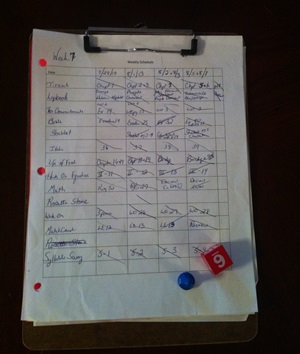
Doing the same old thing every day can lead to bordeom: theirs and yours. Here are a few scheduling tips that will add variety to the order the kids meet their educational tasks.
One of the strategies mentioned in homeschool organization is that every student has their own clipboard. The top sheet of paper on the clipboard is their agenda of subjects and tasks they need to do for the week. Our agenda happens to be weekly, though these ideas can work with daily, weekly, monthly, or any other agenda.
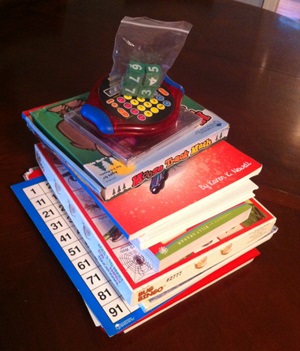
When we do The Stack, each student finds their own stack of books and resources sitting on the table. Usually, to make it easier, the larger things are on the bottom.
Not everything is a book. For instance, flashcards or manipulatives may be included. There may be an index card that states: "Do 15 push ups" for tasks that are less stackable.
The student starts at the top and works their way down through the tasks until they are done.
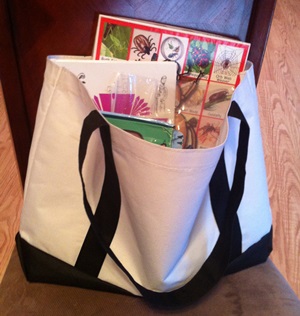
Our Homeschool Sack is a modification of The Stack above. However, instead of stacking all the resources, they are in a bag, pillow case, or box. The kids have to reach blindly into the container and pull out their next educational task.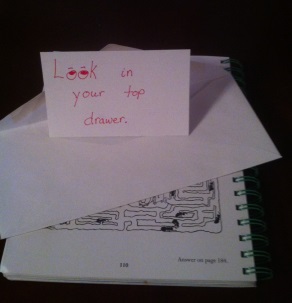
I don't know about your kids, but Scavenger Hunts are always a favorite around here. They wake to find their first assignment sitting on the table. When they complete it, an index card also on the table tells them where their next assignment is located. For instance: "Go look in the piano bench."
Of course, at the next location they will find their task, and their instruction to the next location. (If your kids are prone to sneak peek before hand, you can put the instructions in a sealed envelope.)
It's fun to have something special at the last location: a prize, small snack, an hour at the park, or promise to play a favorite game with them.
The assignment books are spread out in a circle: one on each cushion on the couch, on a chair, two on the coffee table, one on the window ledge, etc.
Then each object is covered with a towel, dish towel, pillow case, or plastic grocery bag. The student gets to blindly pick the next item.
This one is preferred by young students, particularly those who you are doing one on one teaching for every subject.
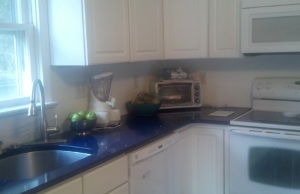 This is a modification of the Ring Around described above. In this case, all the items are placed in a different Kitchen Cabinet or Drawer.
This is a modification of the Ring Around described above. In this case, all the items are placed in a different Kitchen Cabinet or Drawer.
If you have more than one student, you may run out of cabinet space. So for each cabinet or drawer, there is one activity for EACH child. They can take turns picking the next cabinet. Or whoever finishes their assignment can make the choice.
You may have more cabinets and drawers than assignments. In which case you can add a few fun fillers like:
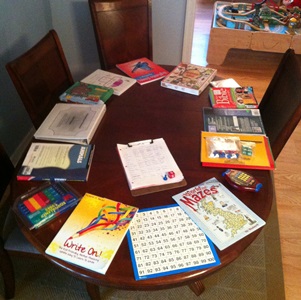 With the Book Version of Roll the Dice, all their books and resources are laid out on a table in a row or circle. Each child would have their books on a different table. The books are in plain view (not hidden like the Ring Around the Couches described strategy above.)
With the Book Version of Roll the Dice, all their books and resources are laid out on a table in a row or circle. Each child would have their books on a different table. The books are in plain view (not hidden like the Ring Around the Couches described strategy above.)
You will also need one die (that's the singular for dice - still wishing someone would rename that) and one game marker from a game board. A small toy, dime, action figure, Matchbox car, doll, etc. would also work.
Roll the die, and your marker moves that many "spaces." The spaces, of course, are the books. When an assignment is completed, it is removed from the table.

The Paper Version of Roll the Dice is similar to the book version above. But instead of using the actual objects as the spaces on the game board, you simply use the list of assignments on your paper schedule. You may need a smaller marker (an actual game marker or penny) since your Barbie doll and action figure won't fit on the paper.
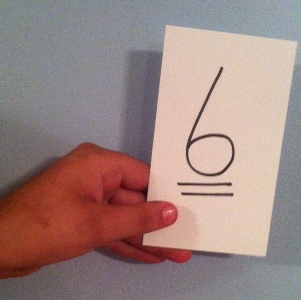
When we play Pick A Number the kids see everything in the room as usual. No special preparation needed here.
They are asked to pick a number between five and ten. Then, using the same method as Roll The Dice - Paper Version as described above, they count that many spaces for each activity. The assignments are marked off as they are done and skipped when counting for the next activity.
Of course, you can also do this in reverse from Shortest to Longest.
Oops! They made a mistake and passed an assignment with a letter close to the beginning? The penalty is they have to say the alphabet as many times as they can in one breath.
In this case, you would have to do all math tasks as a group. All language arts activities would be done before moving to the next subject.
You can let students who finish before others move to the next subject, or wait until everyone finishes and start the next subject together.
The balloons can be kept in an empty box or trash can or taped to a door. You might want to prepare this the night before so the start of your day is not delayed. It will also add some enthusiasm for starting the school day.
The child chooses a balloon and pops it with a pin. Obviously, he or she completes the stated assignment before moving to the next task.
Funny thing is, after all these other ideas are done, the usual task of going through the list in whatever order you want almost seems like a novelty.
Please share your idea. It just might make another child's day.
One of the strategies mentioned in homeschool organization is that every student has their own clipboard. The top sheet of paper on the clipboard is their agenda of subjects and tasks they need to do for the week. Our agenda happens to be weekly, though these ideas can work with daily, weekly, monthly, or any other agenda.
The Homeschool Stack

When we do The Stack, each student finds their own stack of books and resources sitting on the table. Usually, to make it easier, the larger things are on the bottom.
Not everything is a book. For instance, flashcards or manipulatives may be included. There may be an index card that states: "Do 15 push ups" for tasks that are less stackable.
The student starts at the top and works their way down through the tasks until they are done.
The Homeschool Sack

Our Homeschool Sack is a modification of The Stack above. However, instead of stacking all the resources, they are in a bag, pillow case, or box. The kids have to reach blindly into the container and pull out their next educational task.
Scavenger Hunts

I don't know about your kids, but Scavenger Hunts are always a favorite around here. They wake to find their first assignment sitting on the table. When they complete it, an index card also on the table tells them where their next assignment is located. For instance: "Go look in the piano bench."
Of course, at the next location they will find their task, and their instruction to the next location. (If your kids are prone to sneak peek before hand, you can put the instructions in a sealed envelope.)
It's fun to have something special at the last location: a prize, small snack, an hour at the park, or promise to play a favorite game with them.
Ring Around the Couches
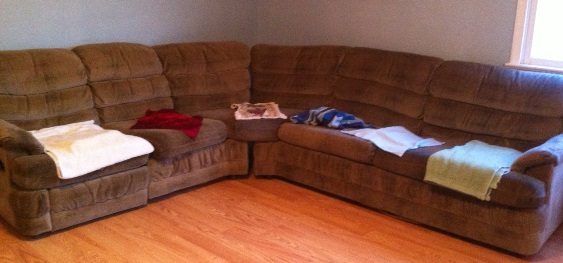
The assignment books are spread out in a circle: one on each cushion on the couch, on a chair, two on the coffee table, one on the window ledge, etc.
Then each object is covered with a towel, dish towel, pillow case, or plastic grocery bag. The student gets to blindly pick the next item.
This one is preferred by young students, particularly those who you are doing one on one teaching for every subject.
Pick A Door
 This is a modification of the Ring Around described above. In this case, all the items are placed in a different Kitchen Cabinet or Drawer.
This is a modification of the Ring Around described above. In this case, all the items are placed in a different Kitchen Cabinet or Drawer.If you have more than one student, you may run out of cabinet space. So for each cabinet or drawer, there is one activity for EACH child. They can take turns picking the next cabinet. Or whoever finishes their assignment can make the choice.
You may have more cabinets and drawers than assignments. In which case you can add a few fun fillers like:
- Hop on one foot ten times
- Take a five minute break
- Write as many words as you can think of from the letters in "spagetti" in three minutes
- Sing "Happy Birthday" backwards
Eenie, Meanie, Miney, Moe
Using whatever version of the famous Eenie, Meanie Poem that is favored in your household, students go down the list on their clipboard. Whatever line they land on, they do, then cross it off the list.Roll the Dice: Book Version
 With the Book Version of Roll the Dice, all their books and resources are laid out on a table in a row or circle. Each child would have their books on a different table. The books are in plain view (not hidden like the Ring Around the Couches described strategy above.)
With the Book Version of Roll the Dice, all their books and resources are laid out on a table in a row or circle. Each child would have their books on a different table. The books are in plain view (not hidden like the Ring Around the Couches described strategy above.)You will also need one die (that's the singular for dice - still wishing someone would rename that) and one game marker from a game board. A small toy, dime, action figure, Matchbox car, doll, etc. would also work.
Roll the die, and your marker moves that many "spaces." The spaces, of course, are the books. When an assignment is completed, it is removed from the table.
Roll the Dice: Paper Version

The Paper Version of Roll the Dice is similar to the book version above. But instead of using the actual objects as the spaces on the game board, you simply use the list of assignments on your paper schedule. You may need a smaller marker (an actual game marker or penny) since your Barbie doll and action figure won't fit on the paper.
Pick A Number

When we play Pick A Number the kids see everything in the room as usual. No special preparation needed here.
They are asked to pick a number between five and ten. Then, using the same method as Roll The Dice - Paper Version as described above, they count that many spaces for each activity. The assignments are marked off as they are done and skipped when counting for the next activity.
Longest to Shortest
Using their written agenda, the have to determine which assignment on the list has the most letters. They complete that assignment, then go to the next longest.Of course, you can also do this in reverse from Shortest to Longest.
Alphabetical Order
Elementary students get to practice their dictionary skills when they determine which assignment comes first in alphabetical order.Oops! They made a mistake and passed an assignment with a letter close to the beginning? The penalty is they have to say the alphabet as many times as they can in one breath.
Kid of the Day
Kids can use their birthdays or take turns being the kid of the day. They get to choose the order of subjects for everyone else.In this case, you would have to do all math tasks as a group. All language arts activities would be done before moving to the next subject.
You can let students who finish before others move to the next subject, or wait until everyone finishes and start the next subject together.
Balloons
Add a circus flare by putting assignments on little folded pieces of paper and tying them in small, colored balloons. (Hope you have a balloon pump for this one.)The balloons can be kept in an empty box or trash can or taped to a door. You might want to prepare this the night before so the start of your day is not delayed. It will also add some enthusiasm for starting the school day.
The child chooses a balloon and pops it with a pin. Obviously, he or she completes the stated assignment before moving to the next task.
Free For All
When you annouce it is The Free For All Day each student gets to choose what order they will do their assignments in.Funny thing is, after all these other ideas are done, the usual task of going through the list in whatever order you want almost seems like a novelty.
Please share your idea. It just might make another child's day.
About Our Site
Hands-On Learning
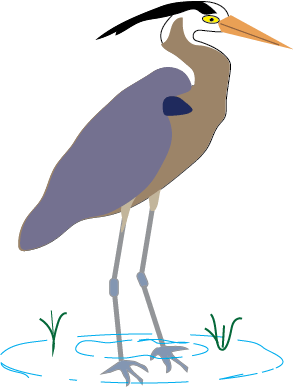
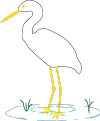

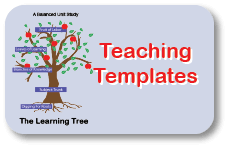

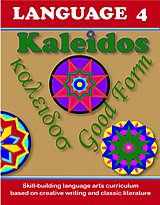
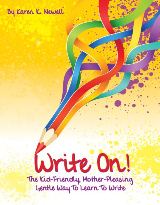
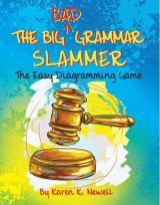
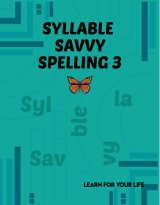
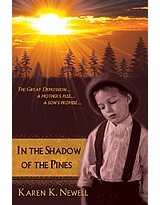
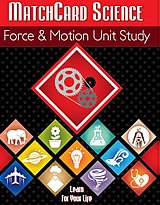


New! Comments
Share your feedback with the rest of the home school community.